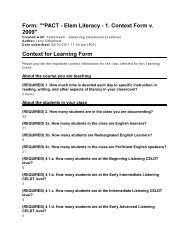The Tutoring Book - California State University, Sacramento
The Tutoring Book - California State University, Sacramento
The Tutoring Book - California State University, Sacramento
Create successful ePaper yourself
Turn your PDF publications into a flip-book with our unique Google optimized e-Paper software.
Reading Out Loud: An Effective Strategy to Engage ESL Writers<br />
81<br />
Julia Bursell<br />
Spring 2004<br />
How is writing like swimming? Give up? Answer: <strong>The</strong> psycholinguist Eric Lenneberg (1967) once<br />
noted, in a discussion of “species specific” human behavior that human beings universally learn to walk<br />
and to talk, but that swimming and writing are culturally specific, learned behaviors. We learn to swim if<br />
there is a body of water available and usually only if someone teaches us. We learn to write if we are<br />
members of a literate society, and usually only if someone teaches us (Brown 334).<br />
I often felt that a similar statement could be made about tutoring: We learn to tutor if we are<br />
members of a community that values interaction, and usually only if we are able to learn from one<br />
another. I started this semester with many questions. Although I still have questions on what the best<br />
approaches to tutoring may be, this semester has been a success largely because writers I worked with<br />
shared their time and their ideas about writing. Each of them taught me something about what encourages<br />
good writing, even if sometimes we both learned the hard way. In particular, working with ESL writers<br />
taught me that while native and non-native English speakers have much in common when approaching<br />
writing, non-native speakers face unique challenges. I would like to describe some of those challenges,<br />
and an approach that we arrived at to make our sessions more effective.<br />
Throughout the first few weeks of active tutoring, I tried hard to remember the guidelines for<br />
promoting good writing. Experiences in the Writing Center, discussions in the classroom, and readings<br />
from the texts emphasized active involvement. In Understanding ESL Writers, Leki asserts that<br />
“Feedback on the writing of both natives and non-natives is generally more effective if it is given when<br />
the students have the opportunity to incorporate the comments into their writing rather than if it appears<br />
on a dead, final text” (127). <strong>The</strong> advice was logical; the tough part was applying it to the best effect.<br />
To begin with, discussions of whether or not to incorporate comments, or interaction of any kind<br />
seemed strained. Writers I met with were congenial, but many, especially those for whom English was not<br />
their primary language, seemed hesitant to say much. I was the only one interested in active conversation.<br />
Remembering good advice, particularly sections from <strong>The</strong> <strong>Tutoring</strong> <strong>Book</strong> on “Learning to Listen and to<br />
Question,” I tried to wait out our “loud” silent pauses. I could see we were both struggling. <strong>The</strong>se were<br />
their words, why weren’t they eager to share their thoughts on writing? Realizing this was unproductive, I<br />
searched for ways to engage the writers. As our sessions progressed, the students (and I) relaxed a bit, and<br />
they began to respond with more than “OK,” or “I guess so.” From our conversations, I began to<br />
understand that their stoic behavior was really deference, or respect, shown to the “authority figures”<br />
(tutors) at the Writing Center.<br />
Early in the semester, the reading material emphasized the importance of establishing a peer<br />
relationship, and collaboration during tutoring. I found that for some ESL students, this only adds to their<br />
tension and sense of awkwardness. Coming from family backgrounds or traditions in which teachers’<br />
opinions should be accepted as spoken, raising questions or even offering a firm opinion might be seen as<br />
impolite. Contributing to an “authority image” is the fact that I am two to three decades older than most of<br />
the students. Although that was unlikely to change, I was determined to be more approachable and<br />
establish a collaborative atmosphere during our sessions.<br />
Asking writers to read out loud proved to be a big step toward achieving this. It began as an<br />
experiment, asking a couple of writers to read their essays out loud to me. My goal was to test several<br />
ideas:

















